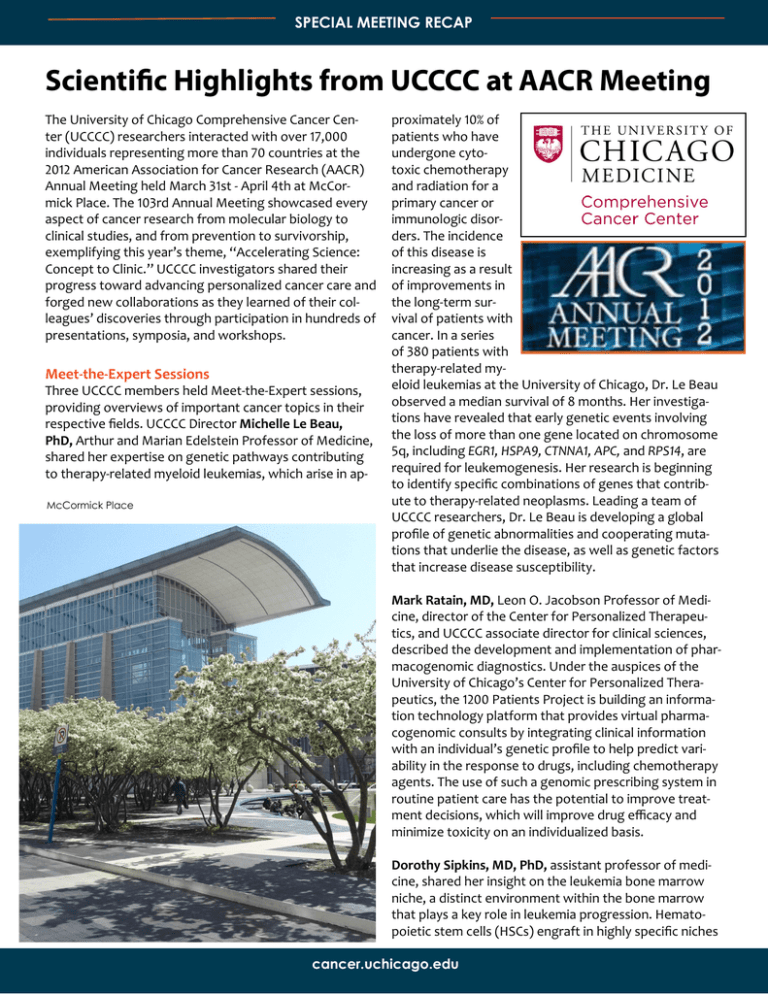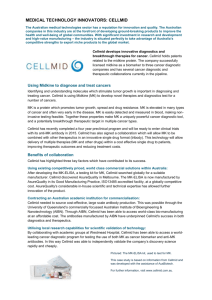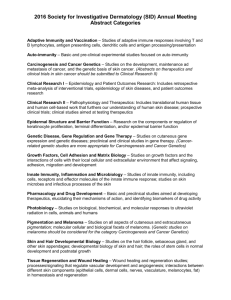UChicago at AACR recap - The University of Chicago Medicine
advertisement

SPECIAL MEETING RECAP Scientific Highlights from UCCCC at AACR Meeting The University of Chicago Comprehensive Cancer Center (UCCCC) researchers interacted with over 17,000 individuals representing more than 70 countries at the 2012 American Association for Cancer Research (AACR) Annual Meeting held March 31st - April 4th at McCormick Place. The 103rd Annual Meeting showcased every aspect of cancer research from molecular biology to clinical studies, and from prevention to survivorship, exemplifying this year’s theme, “Accelerating Science: Concept to Clinic.” UCCCC investigators shared their progress toward advancing personalized cancer care and forged new collaborations as they learned of their colleagues’ discoveries through participation in hundreds of presentations, symposia, and workshops. Meet-the-Expert Sessions Three UCCCC members held Meet-the-Expert sessions, providing overviews of important cancer topics in their respective fields. UCCCC Director Michelle Le Beau, PhD, Arthur and Marian Edelstein Professor of Medicine, shared her expertise on genetic pathways contributing to therapy-related myeloid leukemias, which arise in apMcCormick Place proximately 10% of patients who have undergone cytotoxic chemotherapy and radiation for a primary cancer or immunologic disorders. The incidence of this disease is increasing as a result of improvements in the long-term survival of patients with cancer. In a series of 380 patients with therapy-related myeloid leukemias at the University of Chicago, Dr. Le Beau observed a median survival of 8 months. Her investigations have revealed that early genetic events involving the loss of more than one gene located on chromosome 5q, including EGR1, HSPA9, CTNNA1, APC, and RPS14, are required for leukemogenesis. Her research is beginning to identify specific combinations of genes that contribute to therapy-related neoplasms. Leading a team of UCCCC researchers, Dr. Le Beau is developing a global profile of genetic abnormalities and cooperating mutations that underlie the disease, as well as genetic factors that increase disease susceptibility. Mark Ratain, MD, Leon O. Jacobson Professor of Medicine, director of the Center for Personalized Therapeutics, and UCCCC associate director for clinical sciences, described the development and implementation of pharmacogenomic diagnostics. Under the auspices of the University of Chicago’s Center for Personalized Therapeutics, the 1200 Patients Project is building an information technology platform that provides virtual pharmacogenomic consults by integrating clinical information with an individual’s genetic profile to help predict variability in the response to drugs, including chemotherapy agents. The use of such a genomic prescribing system in routine patient care has the potential to improve treatment decisions, which will improve drug efficacy and minimize toxicity on an individualized basis. Dorothy Sipkins, MD, PhD, assistant professor of medicine, shared her insight on the leukemia bone marrow niche, a distinct environment within the bone marrow that plays a key role in leukemia progression. Hematopoietic stem cells (HSCs) engraft in highly specific niches cancer.uchicago.edu that regulate growth and differentiation, including osteoblastic and vascular niches, which are defined by their association with particular stromal cell types and secretion of specific signaling molecules. Using a mouse model, Dr. Sipkins has demonstrated that leukemic stem cells, which are derived from HSCs, preferentially metastasize to vascular niches expressing stromal cell-derived factor-1 (SDF-1). Leukemic stem cells also create malignant niches that prevent the normal functioning of HSCs. Emerging therapeutic efforts are focused on intercepting leukemia-niche interactions. Symposia In a major symposium focused on next-generation therapeutics, Anthony Kossiakoff, PhD, professor of biochemistry and molecular biology, presented his work on the delivery of synthetic antibodies to cytoplasmic targets. Through extensive studies, he has developed synthetic antigen binders (sABs), a new class of “designer” affinity reagents that recognize specific protein surfaces, which are more cost effective and faster to produce than monoclonal antibodies. Antibodies have traditionally been directed against targets on the cell surface because they cannot penetrate the cell membrane. To overcome this limitation, Dr. Kossiakoff developed an efficient method using a ligand-receptor system that facilitates delivery of sABs into the cell cytoplasm. These reagents can be programmed to carry out a wide range of functions once delivered to the cell interior, including live cell imaging and inhibition of signaling pathways for therapeutic purposes. To demonstrate the approach, Dr. Kossiakoff generated a set of sABs tailored to induce structural changes in the cell cytoskeleton. Introduction of these sABs into cancer cells resulted in decreased cell viability, demonstrating their therapeutic potential. Brandon Pierce, PhD, assistant professor of health studies, described his work on arsenic metabolism and toxicity in a minisymposium covering genetic markers of cancer risk and survival. In collaboration with Habibul Ahsan, MBBS, MMedSc, UCCCC associate director for population research and professor of health studies, medicine, and human genetics, he conducted the first genome-wide association study (GWAS) to investigate the genetic determinants of arsenic metabolism and gene interactions influencing the risk for arsenic-related pre-malignant skin cancer. From an examination of over 1,300 Bangladeshi individuals exposed to arsenic in drinking water, Dr. Pierce identified five genetic variants near the arsenite methyltransferase (AS3MT) gene that are associated with the urinary arsenic metabolites monomethylarsonic acid (MMA) and dimethylarsinic acid The theme of the AACR Annual Meeting 2012, “Accelerating Science: Concept to Clinic,” reflected the synergy between basic, clinical, and translational research that will continue to lead to effective cancer therapies and prevention strategies. (DMA). In a follow-up study, he demonstrated that one of these five variants is associated with an increased risk for arsenic-induced skin lesions, implicating the AS3MT variant as a genetic marker in both arsenic metabolism and toxicity. Special Sessions Mark Ratain, MD, Leon O. Jacobson Professor of Medicine, director of the Center for Personalized Therapeutics, and UCCCC associate director for clinical sciences, chaired and presented at a “Regulatory Science Policy” session addressing regulatory issues associated with the co-development of therapeutics and their companion diagnostic device (or test), also known as in vitro diagnostics. Companion diagnostics help distinguish patients with biomarkers who are more likely to respond to a given treatment. The FDA recently approved the cancer drugs, crizotinib and vemurafenib, and their companion diagnostics (test for ALK expression in non-small cell lung cancer and the BRAF V600E mutation in melanoma, respectively). However, regulatory uncertainties surrounding the co-development of therapeutics and diagnostics present challenges to develop personalized therapies. For example, it remains unclear whether the cancer.uchicago.edu cancer cells arise from the fallopian tube epithelium and implant on the ovary as a secondary site. Contrary to the current paradigm of the ovarian epithelial surface serving as the primary site of origination, this model, if confirmed, will have implications on the detection and treatment of the disease. The meeting brought together more than 18,000 attendees to discuss the latest advances in cancer research. FDA will delay the approval of a drug if its companion diagnostic lacks sufficient validation, if the FDA will require drug testing in biomarker-negative patients, or if the FDA will require approval of existing companion diagnostics that are already considered standard-of-care. These uncertainties present particular challenges for oncology clinical trials that require the use of such diagnostics. In a session on “Current Concepts and Controversies in Organ Site Research,” Hedy Kindler, MD, associate professor of medicine, gave an update on the progress of clinical trials testing personalized therapies for mesothelioma. Current approaches in personalized medicine include molecular profiling to assess disease prognosis and developing biomarkers for the selection of patients most likely to benefit from therapy. For example, researchers have developed a four-gene expression ratio test that is highly predictive of overall survival in patients undergoing surgery for mesothelioma. More recently, studies have indicated that BRCA1 may serve as a predictive biomarker for therapeutic response to vinorelbine in malignant pleural mesothelioma. Similarly, new evidence suggests that activating EGFR mutations may predict therapeutic response; a new Phase II trial at UChicago will examine vinorelbine response in patients with these mutations. Key challenges toward developing personalized therapies include determining whether the therapeutic target drives progression of the disease, and whether the subpopulation of patients most likely to benefit from therapy can be readily identified. Bernard Roizman, ScD, Joseph Regenstein Distinguished Service Professor of Molecular Genetics and Cell Biology, and Biochemistry and Molecular Biology, presented an overview of strategies for the clinical development of oncolytic viruses in cancer therapeutics. Current research is focused on genetically modifying these viruses into more potent and tumor-specific agents for direct tumor cell destruction or delivery of anticancer agents. Approaches include the development of attenuated viruses with impaired ability to replicate in normal cells, viruses retargeted against specific cellular proteins, and viruses that enhance local immune response against tumors. Fourteen clinical trials testing the use of herpes simplex virus (HSV) as a therapeutic agent were completed between 2000 and 2010. For example, a conditionally replicating derivative of HSV type 1, known as G207, showed anti-tumor activity in a Phase I trial of patients with malignant glioma. These advances are anticipated to establish HSV therapy as an important modality for cancer treatment. In addition to these talks, UCCCC members shared their expertise in cancer biology and genetics, pharmacogenomics, and tumor immunology through dozens of poster presentations. Altogether, these works exemplify the UCCCC’s commitment to accelerating personalized cancer therapeutics and interventional strategies for cancer prevention as the standard of medical care. Forums and Poster Presentations UCCCC members also participated in open forums to discuss current topics in cancer research. Ernst Lengyel, MD, PhD, associate professor of obstetrics and gynecology, presented recent findings supporting a new model of serous ovarian carcinogenesis, which proposes that UChicago researchers displayed dozens of poster presentations. cancer.uchicago.edu




